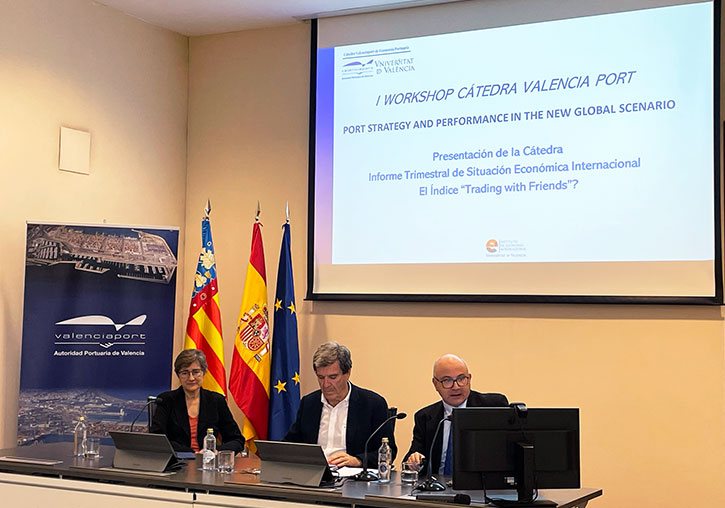
The first workshop of the Valenciaport Chair of Port Economics was held on 25 October. The event was attended by several international experts in the maritime sector.
The Chair of Port Economics organised the workshop ‘Port strategy and performance in the new global scenario’ on 25 October in the Clock Building of the Port of València. The first part of the workshop was attended by the president of the Port Authority of València (APV), Aurelio Martinez; the vice-principal of Innovation and Transfer of the Universitat de València, Rosa María Donat; and the director of the ValenciaPort Chair of Port Economics, Vicente Pallardó.
In the second part, the international speakers shared their analysis on ‘the current maritime-port environment and the importance of sectoral indicators to understand the relevance of ports for economic development’. Michael Dooms (Vrije Universiteit Brussel-Solvay Business School), Theo Notteboom (University Antwerp-Maritime Academy), Thanos Pallis (University of Piraeus), Luis Antonia Rodríguez (United Nations Conference on Trade and Development –UNCTAD–) and Vicente Pallardó took part in this round table, which was moderated by Juan Manuel Díez, head of Strategic Planning of the APV.
‘Trading with friends’ index
Also presented was the 'Trading with friends' indicator, an index to measure the vulnerability of trade with non-democratic countries, which provides an assessment of the degree of dependence of the Spanish economy on countries that do not have full democracies.
The war in Ukraine has generated a certain uncertainty about depending commercially on non-democratic regimes, and some sectors of international trade are even encouraging “decoupling", which consists of breaking off trade relations with countries that are not fully democratic. This trend, according to Vicente Pallardó, director of the Chair, “has very significant costs for the maritime sector and for ports, it would be devastating if international relations with certain countries were to be closed”, warned the director of the Chair.
Given this situation, the ‘Trading with friends’ index is very useful for measuring trade with non-democratic countries. An initial introduction to this indicator shows that 75% of Spanish exports and 60% of imports are carried out with full democratic countries, therefore the degree of dependence on non-democratic countries is not significant, although “in recent years this has increased, especially in imports”. In the case of Valenciaport, Professor Pallardó pointed out that “in the last decade, between 2009 and 2019, the Port of València has increased its traffic with democratic countries by 14%”.
The Valenciaport Chair of Port Economics
This workshop served to publicly present the ValenciaPort Chair of Port Economics, result of the collaboration between the Port Authority of València and the Universitat de València. The aim of this union is to develop research activities related to the analysis and periodic monitoring of the international economic situation, trade and its maritime-port implications, as well as to promote dissemination and foster collaboration and the exchange of knowledge between universities and professionals by facilitating meeting spaces.
- More information on the website of the ValenciaPort Chair of Port Economics
- More information on the website of the Port Authority of València (APV)



